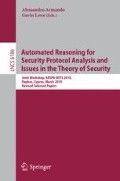Abstract
We introduce a calculus with mobile names, distributed principals and primitives for secure remote communication, without any reference to explicit cryptography. The calculus is equipped with a system of types and effects providing static guarantees of secrecy and authenticity in the presence of a Dolev-Yao intruder. The novelty with respect to existing type systems for security is in the structure of our secrecy and authenticity types, which are inspired by the formulas of BAN Logic, and retain much of the simplicity and intuitive reading of such formulas. Drawing on these types, the type system makes it possible to characterize authenticity directly as a property of the data exchanged during a protocol rather than indirectly by extracting and interpreting the effects the protocol has on that data.
Work partially supported by MIUR Projects SOFT “Security Oriented Formal Techniques” and IPODS “Interacting Processes in Open-ended Distributed Systems”.
Access this chapter
Tax calculation will be finalised at checkout
Purchases are for personal use only
Preview
Unable to display preview. Download preview PDF.
References
Abadi, M.: Secrecy by typing in security protocols. Journal of the ACM 46(5), 749–786 (1999)
Adão, P., Fournet, C.: Cryptographically sound implementations for communicating processes. In: Bugliesi, M., Preneel, B., Sassone, V., Wegener, I. (eds.) ICALP 2006. LNCS, vol. 4052, pp. 83–94. Springer, Heidelberg (2006)
Armando, A., Carbone, R., Compagna, L., Cuéllar, J., Tobarra, M.L.: Formal analysis of saml 2.0 web browser single sign-on: breaking the saml-based single sign-on for google apps. In: FMSE, pp. 1–10 (2008)
Bella, G., Longo, C., Paulson, L.C.: Verifying second-level security protocols. In: Basin, D., Wolff, B. (eds.) TPHOLs 2003. LNCS, vol. 2758, pp. 352–366. Springer, Heidelberg (2003)
Bellare, M., Garay, J.A., Hauser, R., Herzberg, A., Krawczyk, H., Steiner, M., Tsudik, G., Herreweghen, E.V., Waidner, M.: Design, implementation, and deployment of the iKP secure electronic payment system. IEEE Journal on Selected Areas in Communications 18, 611–627 (2000)
Bugliesi, M., Focardi, R.: Channel abstractions for network security. Mathematical Structures in Computer Science xx, xxx–xxx (2010)
Bugliesi, M., Focardi, R.: Language based secure communication. In: Proceedings of the 21st IEEE Computer Security Foundations Symposium, CSF 2008, Pittsburgh, Pennsylvania, June 23-25, pp. 3–16. IEEE Computer Society, Los Alamitos (2008)
Burrows, M., Abadi, M., Needham, R.M.: A logic of authentication. ACM Trans. Comput. Syst. 8(1), 18–36 (1990)
Calzavara, S.: Security Types for Distributed Applications. Master’s thesis, Università Ca’ Foscari di Venezia (2009)
Cardelli, L., Ghelli, G., Gordon, A.D.: Secrecy and group creation. Inf. Comput. 196(2), 127–155 (2005)
Corin, R., Deniélou, P.M., Fournet, C., Bhargavan, K., Leifer, J.J.: Secure implementations for typed session abstractions. In: 20th IEEE Computer Security Foundations Symposium, CSF 2007, Venice, Italy, July 6-8, pp. 170–186. IEEE Computer Society, Los Alamitos (2007)
Dilloway, C., Lowe, G.: Specifying secure transport channels. In: CSF, pp. 210–223 (2008)
Fournet, C., Gordon, A.D., Maffeis, S.: A type discipline for authorization policies. ACM Trans. Program. Lang. Syst. 29(5) (2007)
Gordon, A.D., Jeffrey, A.: Types and effects for asymmetric cryptographic protocols. Journal of Computer Security 12(3-4), 435–483 (2004)
Hennessy, M., Rathke, J.: Typed behavioural equivalences for processes in the presence of subtyping. Mathematical Structures in Computer Science 14(5), 651–684 (2004)
Kamil, A., Lowe, G.: Specifying and modelling secure channels in strand spaces. In: Workshop on Formal Aspects of Security and Trust, FAST (2009)
Kobayashi, N., Pierce, B.C., Turner, D.N.: Linearity and the pi-calculus. ACM Trans. Program. Lang. Syst. 21(5), 914–947 (1999)
Merro, M., Sangiorgi, D.: On asynchrony in name-passing calculi. Mathematical Structures in Computer Science 14(5), 715–767 (2004)
Woo, T.Y.C., Lam, S.S.: A semantic model for authentication protocols. In: IEEE Symposium on Security and Privacy, vol. 178 (1993)
Author information
Authors and Affiliations
Editor information
Editors and Affiliations
Rights and permissions
Copyright information
© 2010 Springer-Verlag Berlin Heidelberg
About this paper
Cite this paper
Bugliesi, M., Calzavara, S., Macedonio, D. (2010). Secrecy and Authenticity Types for Secure Distributed Messaging. In: Armando, A., Lowe, G. (eds) Automated Reasoning for Security Protocol Analysis and Issues in the Theory of Security. ARSPA-WITS 2010. Lecture Notes in Computer Science, vol 6186. Springer, Berlin, Heidelberg. https://doi.org/10.1007/978-3-642-16074-5_3
Download citation
DOI: https://doi.org/10.1007/978-3-642-16074-5_3
Publisher Name: Springer, Berlin, Heidelberg
Print ISBN: 978-3-642-16073-8
Online ISBN: 978-3-642-16074-5
eBook Packages: Computer ScienceComputer Science (R0)

